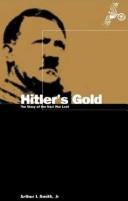| Listing 1 - 6 of 6 |
Sort by
|
Book
ISBN: 0566004828 Year: 1981 Publisher: Aldershot, UK : Gower,
Abstract | Keywords | Export | Availability | Bookmark
 Loading...
Loading...Choose an application
- Reference Manager
- EndNote
- RefWorks (Direct export to RefWorks)

ISBN: 0713995661 9780713995664 9780141003481 0141003480 Year: 2007 Publisher: London: Penguin books,
Abstract | Keywords | Export | Availability | Bookmark
 Loading...
Loading...Choose an application
- Reference Manager
- EndNote
- RefWorks (Direct export to RefWorks)
Economic policy and planning (general) --- Economic order --- World War, 1939-1945 --- Economic aspects --- Germany --- Economic policy --- Economic conditions --- World War, 1939-1945 - Economic aspects - Germany --- Germany - Economic policy - 1933-1945 --- Germany - Economic conditions - 1918-1945
Book
ISBN: 3465034015 9783465034018 Year: 2005 Volume: 181 5 Publisher: Frankfurt am Main: Klostermann,
Abstract | Keywords | Export | Availability | Bookmark
 Loading...
Loading...Choose an application
- Reference Manager
- EndNote
- RefWorks (Direct export to RefWorks)
History of the law --- History of Europe --- anno 1940-1949 --- anno 1930-1939 --- World War, 1939-1945 --- Economic aspects --- Occupied territories. --- #RBIB:gift.2006 --- Occupied territories --- Europe --- Germany --- Economic policy --- Collaborationists --- Territorial questions --- Underground movements --- World War, 1939-1945 - Economic aspects - Germany. --- World War, 1939-1945 - Occupied territories.
Book
ISBN: 9782251381169 2251381163 Year: 2012 Publisher: Paris: Les Belles Lettres,
Abstract | Keywords | Export | Availability | Bookmark
 Loading...
Loading...Choose an application
- Reference Manager
- EndNote
- RefWorks (Direct export to RefWorks)
L'Allemagne d'avant-guerre était-elle une puissance économique réelle ou imaginaire ? L'image de réussite et d'efficacité véhiculée par l'entrée en guerre et le Blitzkrieg a-t-elle faussé les analyses ? La peur quasi panique que les Etats-Unis éclipsent le Vieux Continent a-t-elle induit la stratégie militaire de Hitler ? Autant de questions que cette histoire économique du IIIe Reich rend intelligible, complétant les lectures politiques et militaires habituelles de cette période. " L'histoire économique éclaire d'un jour nouveau à la fois les motifs de l'agression hitlérienne et les raisons de son échec - de son échec inéluctable ", peut-on lire dans la préface. Ce constat exhaustif balaie les idées reçues, offre des conclusions inédites et propose une approche globale assurément nouvelle.
National socialism --- World War, 1939-1945 --- Nazisme --- 2ème guerre mondiale --- Economic aspects --- Aspect économique --- Germany --- Allemagne --- Economic policy --- Economic conditions --- Politics and government --- Politique économique --- Conditions économiques --- Politique et gouvernement --- National-socialisme --- Guerre mondiale (1939-1945) --- 2ème guerre mondiale --- Aspect économique --- Politique économique --- Conditions économiques --- Aspect économique. --- Aspect économique. --- National-socialisme. --- World War, 1939-1945 - Economic aspects - Germany --- Germany - Economic policy - 1933-1945 --- Germany - Politics and government - 1933-1945 --- Germany - Economic conditions - 1918-1945

ISBN: 1859739210 0854966013 9780854966011 9781859739211 Year: 1996 Publisher: Oxford: Berg,
Abstract | Keywords | Export | Availability | Bookmark
 Loading...
Loading...Choose an application
- Reference Manager
- EndNote
- RefWorks (Direct export to RefWorks)
AA / International- internationaal --- CH / Switzerland - Zwitserland - Suisse --- DE / Germany - Duitsland - Allemagne --- 321.64 --- 92 --- 335 --- 333.111.42 --- Geschiedenis. --- Histoire. --- History. --- 92 Geschiedenis. --- 92 Histoire. --- 92 History. --- Fascisme. Nationaal socialisme. --- Economie van conflicten en van verdediging. Oorlog. Terrorisme. Economisch herstel. --- goudreserves en deviezenreserves. --- Goud --- Confiscations and contributions --- World War, 1939-1945 --- Banks and banking --- Destruction and pillage --- Corrupt practices --- Economic aspects --- Reparations --- United States --- Soviet Union --- Foreign relations --- Europe --- Gold --- Germany --- Fascisme. Nationaal socialisme --- Geschiedenis --- Economie van conflicten en van verdediging. Oorlog. Terrorisme. Economisch herstel --- goudreserves en deviezenreserves --- World War, 1939-1945 - Destruction and pillage - Europe --- World War, 1939-1945 - Confiscations and contributions - Europe --- Banks and banking - Corrupt practices - Switzerland --- World War, 1939-1945 - Economic aspects - Germany --- World War, 1939-1945 - Reparations --- United States - Foreign relations - Soviet Union --- Soviet Union - Foreign relations - United States

ISBN: 0521803292 0511012187 0521027306 0511047959 0511511876 0511152701 0511119550 1280159456 0511302134 1107123259 Year: 2001 Publisher: Oxford, UK ; New York : Cambridge University Press,
Abstract | Keywords | Export | Availability | Bookmark
 Loading...
Loading...Choose an application
- Reference Manager
- EndNote
- RefWorks (Direct export to RefWorks)
The Deutsche Bank, Germany's largest financial institution, played an important role in the expropriation of Jewish-owned enterprises during the Nazi dictatorship, both in the existing territories of Germany, and in the area seized by the German army during World War II. In this 2001 book Harold James uses new and previously unavailable materials, many from the bank's own archives, to examine policies which led to the eventual genocide of European Jews. How far did the realization of the vicious and destructive Nazi ideology depend on the acquiescence, the complicity, and the cupidity of existing economic institutions, and individuals? In response to the traditional view that business co-operation with the Nazi regime was motivated by profit, this book closely examines the behaviour of the bank and its individuals to suggest other motivations. No comparable study exists of a single company's involvement in the economic persecution of the Jews in Nazi Germany.
World War, 1939-1945 --- Banks and banking --- 2ème guerre mondiale --- Banques --- Economic aspects --- Jews --- History --- Aspect économique --- Juifs --- Histoire --- Deutsche Bank (1957- ) --- Political activity --- Arts and Humanities --- DE / Germany - Duitsland - Allemagne --- 331.162.22 --- 335 --- -World War, 1939-1945 --- -940.531 --- European War, 1939-1945 --- Second World War, 1939-1945 --- World War 2, 1939-1945 --- World War II, 1939-1945 --- World War Two, 1939-1945 --- WW II (World War, 1939-1945) --- WWII (World War, 1939-1945) --- History, Modern --- Geschiedenis van de private banken. --- Economie van conflicten en van verdediging. Oorlog. Terrorisme. Economisch herstel. --- -Jews --- -Deutsche Bank (1957- ) --- Political activity. --- World War, 1939-1945 - Economic aspects - Germany. --- World War, 1939-1945. --- Finance --- Business & Economics --- Banking --- Deutsche Bank --- 2ème guerre mondiale --- Aspect économique --- Deutsche Bank Aktiengesellschaft --- Doĭche Bank --- Norddeutsche Bank --- Deutsche Bank und Disconto-Gesellschaft --- Rheinisch-Westfälische Bank --- Süddeutsche Bank --- Hessische Bank --- Bayerische Creditbank --- Südwestbank (Germany) --- Disconto Bank --- Berliner Disconto Bank --- 940.531 --- Geschiedenis van de private banken --- Economie van conflicten en van verdediging. Oorlog. Terrorisme. Economisch herstel
| Listing 1 - 6 of 6 |
Sort by
|

 Search
Search Feedback
Feedback About UniCat
About UniCat  Help
Help News
News